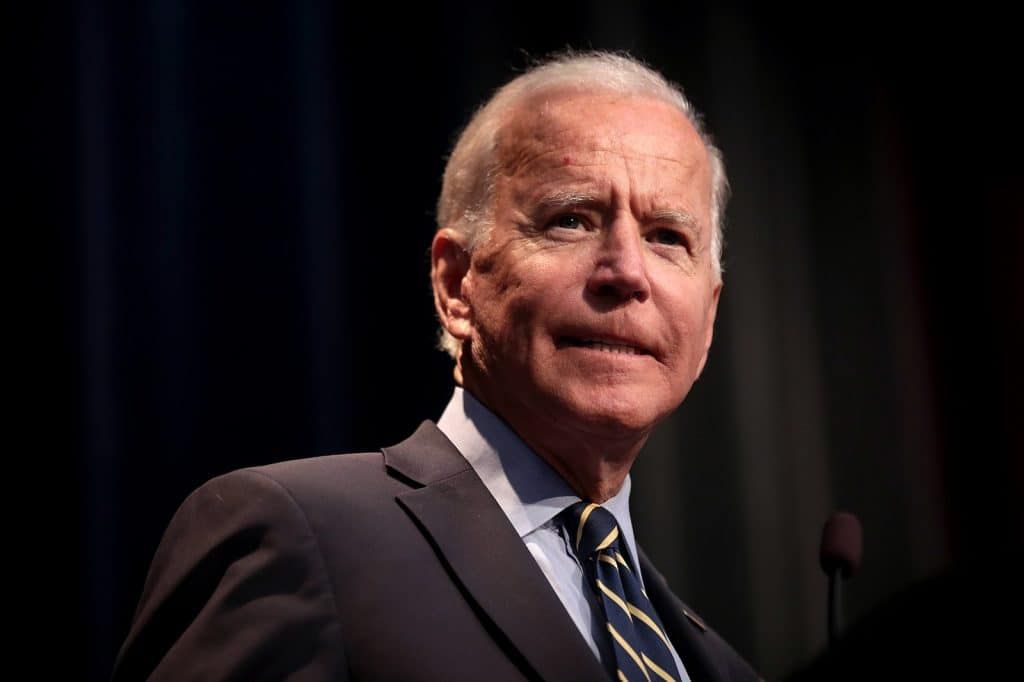Biden’s Trump-lite nuclear policy threatens us all
By Joe Cirincione | January 26, 2022
 Joe Biden. Credit: Gage Skidmore. Accessed via Wikipedia. CC BY-SA 2.0.
Joe Biden. Credit: Gage Skidmore. Accessed via Wikipedia. CC BY-SA 2.0.
The Congressional Budget Office estimates that the government will spend over $634 billion on new nuclear weapons this decade. You might think that President Joe Biden would try to shift some of that money to programs that revitalize the country rather than keep it chained to obsolete Cold War weapons.
You’d be wrong.
Biden will soon release a document—the Nuclear Posture Review (NPR)—laying out his administration’s vision on nuclear risks. All indications are that it will look a lot like former president Donald Trump’s.
Although Biden has been a life-long champion of nuclear arms control, he will only trim a few programs and adjust some rhetoric but basically keep in place most of Trump’s weapons and policies.
You can understand why. Biden has his hands full with some of the most severe crises America has ever faced. Global conflicts loom, allied unity is frayed, his political support at home is razor-thin, and he is under constant attack by a frenzied Republican opposition. Anything that makes him look weak or risks the defection of a Democratic politician jeopardizes his entire agenda.
So, Biden wants to play it safe. Like a football team whose big plays are blocked by the other side, he wants to grind out small gains.
A Trump-lite nuclear posture will avoid major fights with the five large corporations that build these weapons, their supporters in Congress, and the experts they fund. It will keep money flowing into congressional districts and states. Progressives won’t like it, but it will largely preserve the unity of the Democratic caucuses in the House and Senate. So, smart, right?
No. By playing defense, Biden passes on his biggest chance for transformational change. He will all but kill his commendable goal of remaking America’s security priorities. When he was introduced as Biden’s national security advisor in November 2019, Jake Sullivan said that Biden had tasked them to “reimagine national security” to include “the pandemic, the economic crisis, the climate crisis, technological disruptions, threats to democracy, racial injustice, and inequality in all forms.” This concept has broad support across the political spectrum.
Catherine Lutz and Neta Crawford of Brown University’s Cost of War project wrote at the beginning of the COVID-19 crisis, “America isn’t ready for this pandemic because our government has been spending money on the wrong things. We have stockpiled thousands of weapons but not enough ventilators.”
Washington Post columnist Max Boot, a key supporter of the Iraq invasion, agrees. “What we really need is a more radical rethink of the whole concept of ‘national security,’” he wrote. “It never made any sense, as Trump’s 2021 budget had initially proposed, to increase spending on nuclear weapons by $7 billion while cutting Centers for Disease Control and Prevention funding by $1.2 billion.”
Biden thought that he could do both—keep the Pentagon budget high, while adding trillions to education, health care, and social programs through his Build Back Better Act. It might have worked. But his domestic spending bill collapsed in the Senate, while funding for the military has soared to the highest level it’s been since World War II.
It increasingly looks like Biden can’t have it all. He’s going to have to choose. This is where his NPR comes into play.
Reports indicate that the review—conducted by Pentagon officials and contractors with token input from other departments—will cancel one or two small nuclear programs, most likely a new sea-launched cruise missile and a huge air-dropped bomb, the B-83, that is 100 times more destructive than the bomb that leveled Hiroshima. It will also likely tweak US policy to be more supportive of arms control and narrow the range of situations where the United States would start a nuclear war.
Biden will leave in place the most dangerous weapons in the US arsenal, the land-based missiles that must be fired within a few minutes of a warning of an attack—even before a president could be certain that the attack was not a computer error or cyber hack. Worse, it will endorse, for the first time by a Democratic president, the Pentagon’s plan—rushed through by Trump in his final months—to build a brand new intercontinental ballistic missile that will cost over $264 billion. All told, the Pentagon’s nuclear plans will cost at least $2 trillion over the next 25 years.
Fifty-six members[i] of Congress are making a last-minute plea to Biden not to rubber stamp the programs promoted by Trump and hawks in the Pentagon. “Your forthcoming NPR should reflect your administration’s views, not embrace President Trump’s nuclear weapons programs,” they wrote in a letter today. The group is led by Sens. Ed Markey, a Democrat of Massachusetts, and Jeffrey Merkley, a Democrat of Oregon, and Reps. Don Beyer, a Democrat of Virginia, and John Garamendi, a Democrat of California.
They want Biden to defer plans for a new ICBM and other new weapons until independent studies verify their cost and necessity. “A clean break with President Trump’s policies can send a strong signal to Russia and China that the United States believes restraint and nuclear arms reduction are measures of a country’s great power status, not nuclear weapons overkill,” they argue.
If Biden does not take their advice, he will leave in place Cold War policies, including the first use of nuclear weapons in a conflict, the sole authority of the president to fire these weapons, and keeping hundreds of missiles on hair-trigger alert. These policies combine to give one person the power to destroy in minutes all that humanity has constructed over millennia.
These procedures greatly increase the risk that a conflict over Ukraine or Taiwan could escalate into a nuclear exchange, even with the most steady finger on the nuclear button. Worse, what if that finger isn’t so steady? America just had an unstable president with this power. Biden could act now to make sure a mad president can never again threaten global destruction.
It’s not just the money that matters. It is our very survival and what we stand for as a nation. Martin Luther King, Jr. understood the inherent connection between nuclear threats and social justice. These two issues are tied together in many, many ways. “It is a wonderful thing to work to integrate lunch counters, public accommodations, and schools,” he said. “But it would be rather absurd to work to get schools and lunch counters integrated and not be concerned with the survival of a world in which to integrate.”
We have to hope that Biden listens to his congressional colleagues, that he uses his power to seize what they call “a once-in-a-generation opportunity to ensure that US nuclear doctrine reflects your recognition that a nuclear war cannot be won and must never be fought.”
We have to hope that he realizes before it’s too late that what looks like playing it safe is really the most dangerous policy of all.
[i] House (45): Don Beyer, co-lead; John Garamendi, co-lead; Barbara Lee (CA-13), James P. McGovern (MA-02), Ilhan Omar (MN-05), Earl Blumenauer (OR-03), Mike Quigley (IL-05), Pramila Jayapal (WA-07), Katie Porter (CA-45), Bonnie Watson Coleman (NJ-12), Alan Lowenthal (CA-47), Peter Welch (VT-At Large), Alexandria Ocasio-Cortez (NY-14), Steve Cohen (TN-09), Maxine Waters (CA-43), Rashida Tlaib (MI-13), Dina Titus (NV-01), Andy Levin (MI-09), Grace Meng (NY-06), Ro Khanna (CA-17), Jerry McNerney (CA-09), Bobby L. Rush (IL-01), Bill Foster (IL-11), Ted Lieu (CA-33), Jared Huffman (CA-02), Jesus “Chuy” Garcia (IL-04), Mark Pocan (WI-02), Eleanor Holmes Norton (D-DC), Gwen Moore (WI-04), Mark Takano (CA-41), Sara Jacobs (CA-53), Adriano Espaillat (NY-13), Jamie Raskin (MD-08), Raul Grijalva (AZ-03), John Yarmuth (KY-03), Karen Bass (CA-37), Chellie Pingree (ME-01), Jerrold Nadler (NY-10), Ayanna Pressley (MA-07), Henry C. “Hank” Johnson (GA-04), Jan Schakowsky (IL-09), Peter A. DeFazio (OR-04), Andy Kim (NJ-03), Donald M. Payne, Jr. (NJ-10), and Joe Neguse (CO-02).
Senate (11): Ed Markey, co-lead; Jeff Merkley, co-lead; Elizabeth Warren (D-Mass.), Tina Smith (D-Minn.), Tammy Baldwin (D-Wisc.), Chris Van Hollen (D-Md.), Bernie Sanders (I-Vt.), Patty Murray (D-Wash.), Ron Wyden (D-Ore.), Patrick Leahy (D-Vt.), and Sherrod Brown (D-Ohio)
Together, we make the world safer.
The Bulletin elevates expert voices above the noise. But as an independent nonprofit organization, our operations depend on the support of readers like you. Help us continue to deliver quality journalism that holds leaders accountable. Your support of our work at any level is important. In return, we promise our coverage will be understandable, influential, vigilant, solution-oriented, and fair-minded. Together we can make a difference.
Keywords: Biden, Nuclear Posture Review, nuclear posture, nuclear risk, nuclear weapons
Topics: Nuclear Risk, Nuclear Weapons
















600 billion? Plus China nukes and Russian nukes and North Korean nukes..the list is endless … on top of that ..we are already well into the Anthropocene extinction. Climate change and biomass loss if very serious business. 100 seconds to midnight is just too optimistic in my humble opinion. Personally I would consider a 10 second count down as more realistic to the situation at hand.